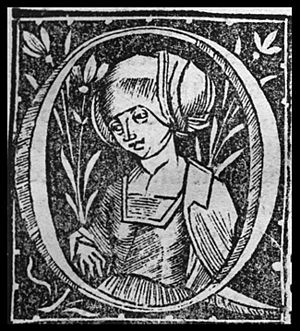Paul of Aegina facts for kids

Paul of Aegina, also known as Paulus Aegineta, was a famous Greek doctor who lived in the 7th century. He was born on the island of Aegina. He is best known for writing a large medical book called Medical Compendium in Seven Books. Many people consider him the "Father of Early Medical Writing." For a long time in the Byzantine Empire, his writings contained almost all the medical knowledge of the Western world. They were known for being very accurate and complete.
Paul's Life
We don't know much about Paul of Aegina's personal life. We know he was born on the island of Aegina. He also traveled a lot, visiting places like Alexandria. Sometimes, people called him Iatrosophistes, which means "wise doctor." He was also called Periodeutes, which probably means a doctor who traveled from place to place to help people.
The exact time he lived isn't perfectly clear. However, he mentioned another doctor, Alexander of Tralles, in his work. Also, another writer, Yahya ibn Sarafyun, mentioned Paul. This helps us guess that Paul lived in the second half of the 7th century.
His Important Works
Paul of Aegina wrote several medical books. His most important work is commonly called Medical Compendium in Seven Books. The Greek title for this book means "epitome of medicine." An epitome is like a summary or collection of important information. So, his book was mostly a collection of knowledge from earlier medical writers.
Impact of His Writings
Paul's reputation was very strong, especially in the Islamic world. It's said that midwives often asked for his advice. Because of this, he was sometimes called Al-kawabeli, which means "the Accoucheur" or "the obstetrician." This name refers to someone who helps with childbirth. Arabic writers also say he wrote books about women's illnesses and how to care for and treat children.
His main work was translated into Arabic by a famous translator named Hunayn ibn Ishaq. The sixth book of his Medical Compendium was especially important. This book was all about surgery. Doctors in Europe and the Arab world used it for many years throughout the Middle Ages. It's a very important book for understanding the history of surgery.
The complete Greek version of his work was first published in Venice in 1528. Other editions and several Latin translations followed. The first full translation into English was done by Francis Adams in 1834.
Honours and Legacy
In 1753, a famous botanist named Carl Linnaeus named a genus of flowering plants after Paul of Aegina. This plant genus is called Aeginetia. These plants belong to the family Orobanchaceae and are mostly found in tropical Asia. It was a way to honor Paul's contributions to knowledge.
See also
 In Spanish: Pablo de Egina para niños
In Spanish: Pablo de Egina para niños
 | Delilah Pierce |
 | Gordon Parks |
 | Augusta Savage |
 | Charles Ethan Porter |

